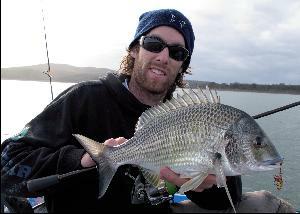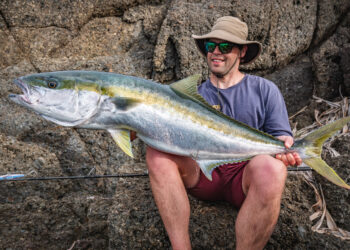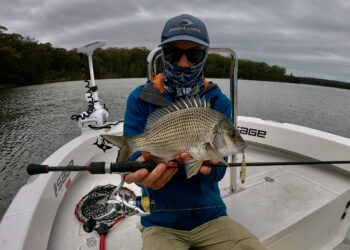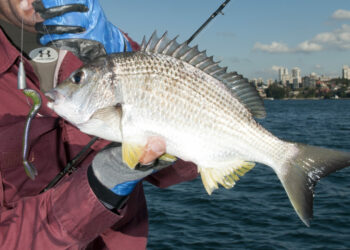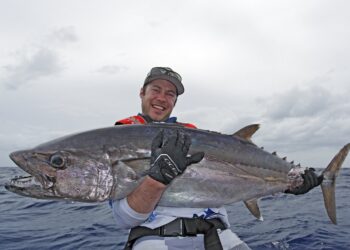A bewildering array of questions confront keen lure anglers on the water. Which lure? Where to cast? What retrieve style? Are there any bloody fish? But don’t worry. BRETT GEDDES has all the answers!
CASTING lures all day searching for fish can be tedious, infuriating, even depressing. Especially on the really slow days when our quarry all seem to have a bad case of lock jaw. There’s a constant battle with trying to cover as much water as possible while making sure we present a lure to as many targets as we can. The thought of big fish not getting a look at our lure because of going too fast or too slow can beat your head in. Not to mention the frustration of working an area that seems to be devoid of fish for way too long. “Should I go or should I stay?” This decision can make or break your day on the water and indeed be the measure of successful anglers versus the hacks. How do you ever know if you’re leaving fish to find fish? If you’re into chasing Murray cod, barra, bream, flathead, estuary perch or in fact any fish on lures, here are a few ideas and tricks to increase your catch.
First cast best cast
For years I’ve always believed my first cast to a fish and indeed its initial look at the lure was when I’d either get a hit or the fish would show no interest or maybe even spook. For this reason I’ll rarely if ever flog a lure into the same spot. After years of trial and error, I believe my first cast is nearly always my best one. I know a lot of anglers who swear by doing the opposite and squander hours foaming up the same water. I’ve seen this habit at its worst by those working snags and fished with guys willing to invest 20 or 30 casts to even the smallest structure. Maybe a fish will eat your lure on the seventh or 13th cast but more often than not if your first lure presentation is ignored, and a slower second retrieve as well, you should move on. Larger structure like whole trees in the water require more work but logic will prevail as to how long you spend on it. If you are confident that fish are seeing the lure, your job is done. Look, I’ve pulled an EP off a small snag on the 20th cast but usually on structure that has history – like a favourite hidden submerged log that has produced regularly over many years. More often than not those fish are cranky due to the constant flogging they get and you could eventually make them crack and snap at a lure, but you will more than likely shut them down even more (something bream anglers will all agree with). Give it a few casts and then, if you can, try to rest that snag for a few weeks and maybe those fish will come back on the chew.
This logic also applies to schooling bottom dwellers or mid-water fish that don’t have to congregate around structure.
Millimetre perfect?
Accurate casting will always increase hook ups but most fish are very good at seeing lures from a distance. How far? Well, easily a metre and in very clear water double or triple that. Some anglers are happy to get a lure within 10 or 20cm from their mark and this is ordinarily good enough. Others are pedantic about putting a lure repeatedly just millimetres from a target but, again, this is usually wasteful fishing effort. Quite often those same fishos, in the quest for that absolute perfect cast, are constantly hanging lures up in trees, jetties and rock walls or getting snagged up in reeds or timber. Retrieving those lures spooks your quarry and causes much frustration, costing you plenty of fish. If you have a fishing partner, constant snags will piss them off no end and might even lead to WWIII if winning a comp is at stake. The problem is, of course, that some species are happy to smack a lure but reluctant to move far from their home. Armed with this knowledge, you will soon adapt to differing water conditions and target species. Fish a lot to learn a lot.
In summing up, I see a lot of proud anglers making almost impossible casts to impressive lure eating snags but their catch rates remain on a par to most of us.
Sounders
Fish finders are probably the greatest device in angling ever invented and thanks to ever developing instruments our eyes below the water are now even better. Side imaging sounders are just about standard issue for any serious angler nowadays. Will this technology ever stop? I mean, soon we might be able to see every individual fish clearly and then get its length posted up on the screen, next to its weight and species. Sounds far fetched but as we all know every year in the real world is about 20 years in the “tech world”. Buy a sounder today and it will be old news and due for the scrap heap in three seasons.
Can you believe in all my years of fishing I’ve never used a sounder? I was once proud not to have relied on sounders when all my mates were telling me to get with the times. In my defence, though, I mainly fish skinny water with surface lures or very snaggy country with deep sinking hard-bodies. These waters don’t require a sounder. These days I’m doing more very deep work with plastics and blades and there is no doubt this is where sounders come into their own, especially when marking fish. In fact, without one you are handicapped no end so I’m shopping around right now but am getting bogged down with all the choice and stuff on the market!
Fish will always be caught without a sounder but they broaden your options, help you learn more about fish behaviour and give you a detailed look at water depths and bottom topography. There’s also the benefit of getting water temps and, at times, the very important divide or salt wedge in the water column between the fresh going over the heavier saline water. Pretty simple really, if you own a ’yak or a boat – buy a sounder.
Foamy water
My pet hate and biggest knock on confidence is having to fish “foamy” water. Or more to the point, begrudgingly working an area where the fish have already seen dozens of lures just hours before I get there. I get cranky knowing the water has been worked over a few days prior or even during the last week. The worst case scenario is when a lot of fish have actually been caught in that area. This shuts down fish more than anything, in my view. Not just for those returned fish with a lingering jaw ache but somehow fish have this ability to talk to each other and warn others not to eat lures. If you think this is a bullshit theory then you ain’t seen how schooling fish quickly shut down when their mates get yanked out of the water. OK, so maybe they don’t talk as such but can they send out some sort of distress signal? Or is it just the sight of a hooked up fish making those around him become spooky? Many anglers back me up on this assumption. I’ve seen schools of flathead shut down for weeks on end after getting flogged to death and some people call duskies a dumb fish. Even dizzy Australian salmon and brainless English redfin can eventually wise up to constant harassment, although it’s fair to say sometimes they don’t! If you refuse to believe certain species are prone to over fishing then you have got to spend more time on the water. The trick is to avoid casting to distressed or cranky fish so you should be aware of heavily fished waters and don’t flog your favourite honey holes.

Two of 30 bream landed during a hot four hour session of fast and deep blade searching
Moving on
Mobile anglers are winning anglers. Saving time, steering clear of foamy water and increasing catch rates becomes an intuitive thing that requires planning and good sense. Presenting new lures to fish can sometimes work wonders and even dramatically changing retrieval styles will yield fish but I maintain your biggest asset in fishing is to keep moving forward. I’m extremely confident when casting to “fresh” fish and it’s the main reason I enjoy out-of-the-way locations and secret backwaters. In fact, everyone wants to fish new water but most of us have no choice but to get on popular locations. This is even more reason to keep searching and with our ever busy lives you have to maximise precious hours and even minutes on the water. Super slow is never the go. There is no worse crime in fishing than to keep casting to shut-down or flogged at fish. Yes, you will be accused of being impatient, rushed and even rash but I betchya you end up with a lot more fish under your belt.



